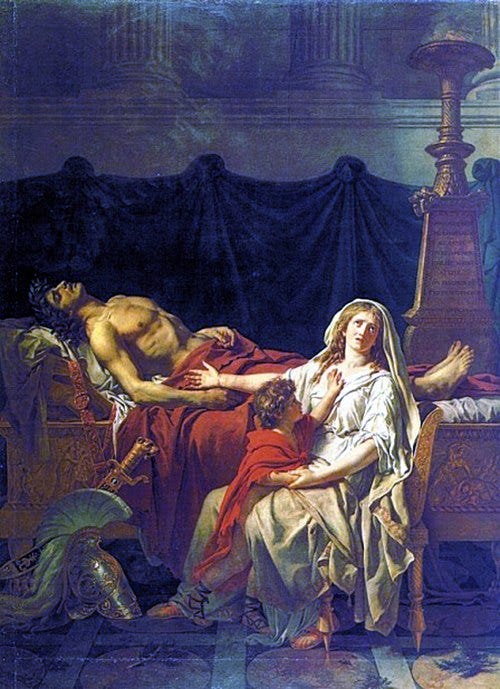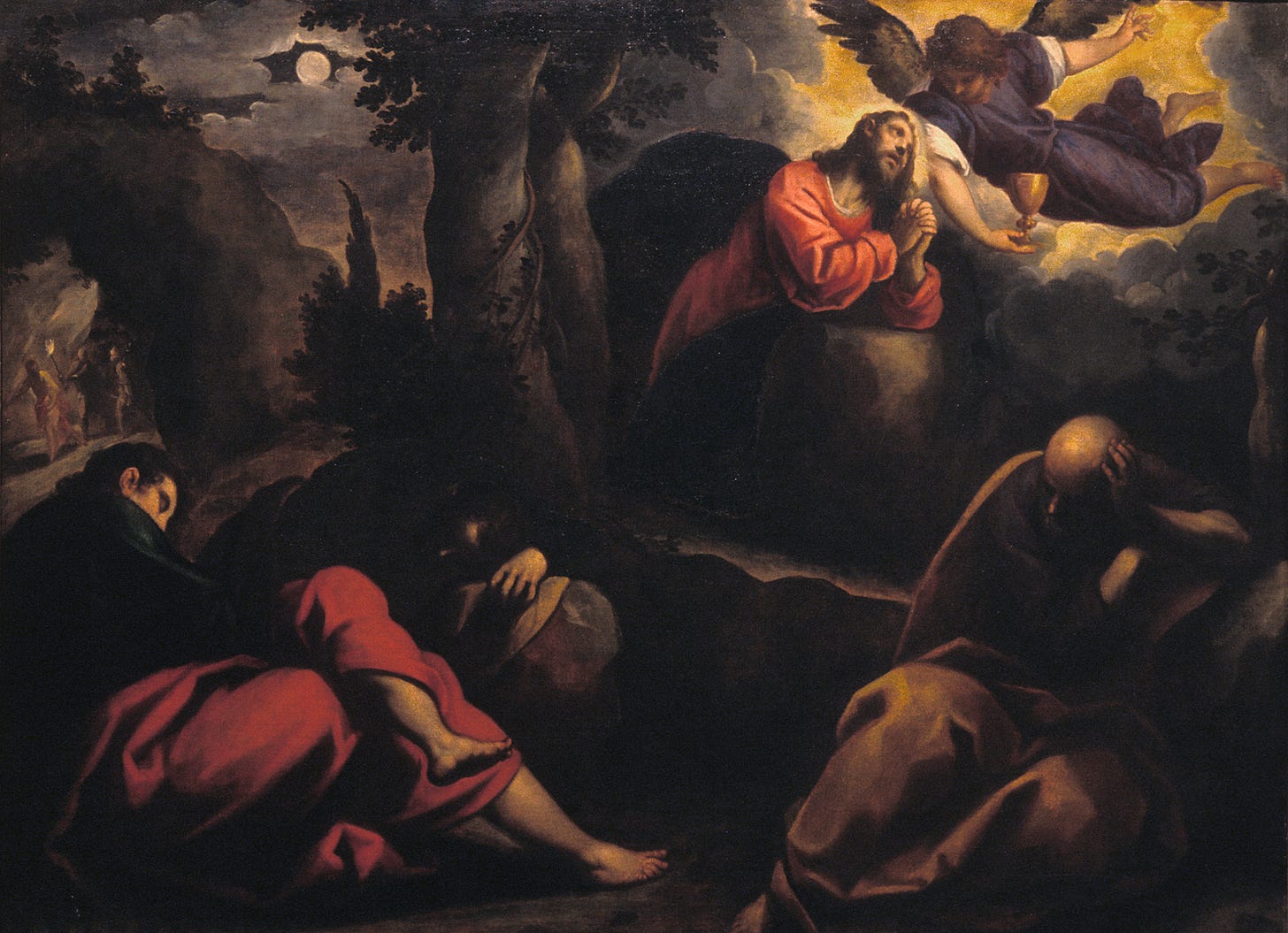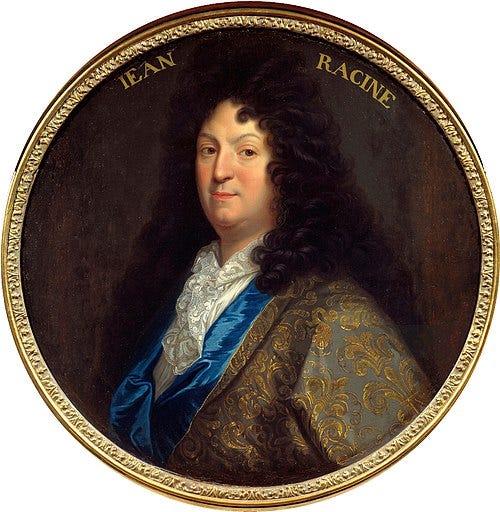Andromache: A Slow Motion Car Crash
A Review and Application of Jean-Baptiste Racine's Play
Love is a fire the heart can’t hide from view. -Orestes1
Not my will, but thy will be done. -Jesus
________
I read Racine’s play, Andromache, in the first two hours of my flight from Los Angeles to Boston. I am on my way to meet my wife (who has been visiting friends in Oklahoma) and together visit our son at Northeastern University. I was excited to use the 5-hour flight time to sharpen my skills in character development and dialogue for my upcoming book. Racine did not disappoint. Moreover, I was surprised by the spiritual lesson I learned.
As I read the play, I wrote some of Racine’s words (in translation from the French) in the margin of my notes. They were powerful words like: sate, ardent, maze-like, and abased. Some phrases caught my eye. In the first act, as King Pyrrhus is reflecting on the horror of war, he says things like:
“Darkness and victory, more cruel than we, incited us to random butchery.”2
“…shall my cruelty outlast my wrath?”
“…bathe my hands in infant gore?”
(I don’t know how I would use this last one, but boy is it powerful!)
I want to write with such powerful words and phrases. But Racine combines this skill with a very concise group of speaking characters, quick sentences, and short scenes. It is amazing to reflect on how he draws so much emotion using such a small number of lines.
The main characters are familiar from Greek Tragedy.
King Pyrrhus: who though pledged to the princess Hermione, is in love with Andromache.
Andromache: Hector’s widow, who is still in love with her slain husband. (after King Pyrrhus killed him in battle and won her and her son as his prize.)
Hermione: a princess who is pledged to King Pyrrhus and has grown to love the King.
Orestes: who is in love with Hermione and, though sent to retrieve and kill Andromache’s son as a potential threat to his people, wants Hermione to be his wife.
You can already see that the story, like a good old Greek tragedy, is headed for a crash. I was reminded of an old J. Geils Band song, “Love Stinks,” as I read the play. In much less eloquent language, the rockers sing,
You love her, but she loves him, And he loves somebody else. You just can’t win.
And so it goes, ‘Til the day you die, This thing they call love, It’s gonna make you cry.
Until the final act of the story, the dividing line between the strong passion of love and the deep wound of hate is crossed again and again. The reader hopes the lovers will find sense as their frustrated love accelerates their story in the fast lane.
Each character has their own tragic situation:
King Pyrrhus is in turmoil because he has committed to marry Hermione, but is in love with Andromache. This throws him into turmoil between love and duty. He longs for Hermione to call out his betrayal, saying: “For in my breast a thousand tongues will flay My conscience all the more, the less you say.”3
Andromache is still in love with her dead husband: “Hector it was who set my heart on fire, And in his tomb I’ve buried my desire.”4
Hermione no longer loves Orestes but longs to marry King Pyrrhus instead. When the King makes his love of Andromache clear her love turns to hate and she plans her revenge. Her servant Cleone warns her, “Madam, your courting ruin; beware -“ to which she replies, “What care I? Vangeance is my only care.”5
Orestes’ whose love for Hermione pushes him to kidnap her while his duty is to take the son of Andromache and kill him, thrusts him into the path of a crash with the gods. As he puts it to his friend: “Why, always, must an unjust providence Let evil be and punish innocence?”6
Each of the main characters has a friend like Cleone who speaks the truth. Their advice shows the reader, if not the tragic main characters, the other available paths. But any moments of clarity in the main character are fleeting. Pyrrhus, in a moment of clarity that he must fulfill the commitment he made to Hermione, says, “Then I was blind, but now my eyes can see.”7. But this moment of wisdom is quickly washed away by waves of desire. He commits to marrying, Andromache. Upon hearing this news, Hermione chooses an “eye for an eye” saying, “My own mind frightens me…” and about the King, “I have loved him too much not to hate him now.”8
(Spoiler alert: skip the next paragraph if you plan to read Andromache.)
In the final act, Pyrrhus joyfully marries Andromache. Andromache commits to the king, not out of love, but to protect her son. Orestes, at the behest of the spurned Hermione, gathers his men and kills the King. He returns to her expecting love but finds, instead, that she despises him for killing her love. Hermione runs to the dying king and kills herself. Andromache becomes Queen (and will likely attack Orestes’ people), and the play ends with Orestes’ men spiriting him away as he becomes more and more delusional.
Though this is the end of Racine’s play, it is not, thankfully, the end of the human story. When the story of Andromache totters on the edge of inevitable tragedy, Cleone says to Hermione, “Madam, your will is; the die is cast!” But followers of Jesus know a different story, with similar language, but a very different result.
In the Garden of Gethsemane, the main character of this story had to choose between a strong desire for self-preservation and his love of God. He said: “Going a little farther, he fell with his face to the ground and prayed, ‘My Father, if it is possible, may this cup be taken from me.’”9 Yet not as I will, but as you will.’. With this decision, the die was cast in a very different way. The tragedy of human history has never been the same.
Coincidence or not, there are two phrases in Andromache reflected in two famous hymns written by followers of Jesus more than a century later than Racine’s play. John Newton, a slave trader turned Jesus follower, uses words similar to King Pyrrhus, but in a very different way, when he penned Amazing Grace “I once was lost but now am found, was blind, but now I see.”
About 40 years before Amazing Grace, Charles Wesley reflects the King’s words in his hymn “O for a thousand tongues…” not to speak of guilt and punishment, but to celebrate the grace and forgiveness of God, “…to sing, my great Redeemer’s praise, the glories of my God and King, the triumphs of his grace!”
Jesus’ decision in the garden allows us to change our stubborn and spineless desires, so well portrayed by Racine, into a powerful force for making good happen.
As my plane nears its destination, my challenge is not only to develop my story like Racine, with sttrong words, phrasing and with the interaction between the characters driving the story to its climax, but also to let go of that tragic desire to possess those whom I love and step deeper instead into the love of Jesus that seeks, before all things, the good, of those I love.
All citations are from Richard Wilbur’s 1980 Translation of Andromache. Page 36
Page 15
Page 86
Page 58
Page 83
Page 52
Page 63
Page 28-29
Matthew 36:29





Interest way to bring your reader around to seeing with clarity the ultimate point